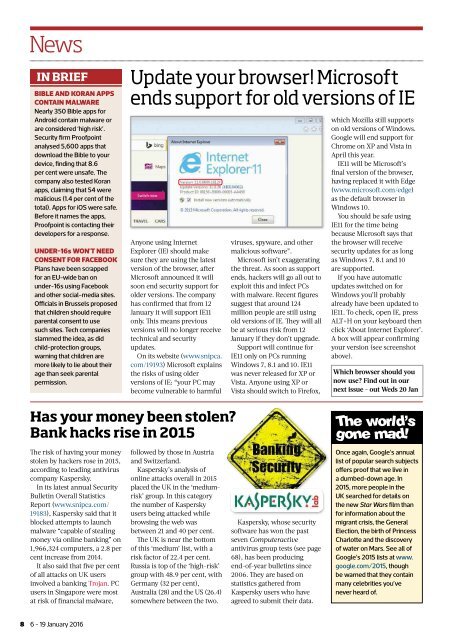Create successful ePaper yourself
Turn your PDF publications into a flip-book with our unique Google optimized e-Paper software.
News<br />
IN BRIEF<br />
BIBLE AND KORAN APPS<br />
CONTAIN MALWARE<br />
Nearly 350 Bible apps for<br />
Android contain malware or<br />
are considered ‘high risk’.<br />
Security firm Proofpoint<br />
analysed 5,600 apps that<br />
download the Bible to your<br />
device, finding that 8.6<br />
per cent were unsafe. Th e<br />
company also tested Koran<br />
apps, claiming that 54 were<br />
malicious (1.4 per cent of the<br />
total). Apps for iOS were safe.<br />
Before it names the apps,<br />
Proofpoint is contacting their<br />
developers for a response.<br />
UNDER16s WON’T NEED<br />
CONSENT FOR FACEBOOK<br />
Plans have been scrapped<br />
for an EU-wide ban on<br />
under-16s using Facebook<br />
and other social-media sites.<br />
Officials in Brussels proposed<br />
that children should require<br />
parental consent to use<br />
such sites. Tech companies<br />
slammed the idea, as did<br />
child-protection groups,<br />
warning that children are<br />
more likely to lie about their<br />
age than seek parental<br />
permission.<br />
Update your browser! Microsoft<br />
ends support for old versions of IE<br />
Anyone using Internet<br />
Explorer (IE) should make<br />
sure they are using the latest<br />
version of the browser, after<br />
Microsoft announced it will<br />
soon end security support for<br />
older versions. Th e company<br />
has confirmed that from 12<br />
<strong>January</strong> it will support IE11<br />
only. Th is means previous<br />
versions will no longer receive<br />
technical and security<br />
updates.<br />
On its website (www.snipca.<br />
com/19193) Microsoft explains<br />
the risks of using older<br />
versions of IE: “your PC may<br />
become vulnerable to harmful<br />
viruses, spyware, and other<br />
malicious software”.<br />
Microsoft isn’t exaggerating<br />
the threat. As soon as support<br />
ends, hackers will go all out to<br />
exploit this and infect PCs<br />
with malware. Recent fi gures<br />
suggest that around 124<br />
million people are still using<br />
old versions of IE. Th ey will all<br />
be at serious risk from 12<br />
<strong>January</strong> if they don’t upgrade.<br />
Support will continue for<br />
IE11 only on PCs running<br />
Windows 7, 8.1 and 10. IE11<br />
was never released for XP or<br />
Vista. Anyone using XP or<br />
Vista should switch to Firefox,<br />
which Mozilla still supports<br />
on old versions of Windows.<br />
Google will end support for<br />
Chrome on XP and Vista in<br />
April this year.<br />
IE11 will be Microsoft’s<br />
fi nal version of the browser,<br />
having replaced it with Edge<br />
(www.microsoft.com/edge)<br />
as the default browser in<br />
Windows 10.<br />
You should be safe using<br />
IE11 for the time being<br />
because Microsoft says that<br />
the browser will receive<br />
security updates for as long<br />
as Windows 7, 8.1 and 10<br />
are supported.<br />
If you have automatic<br />
updates switched on for<br />
Windows you’ll probably<br />
already have been updated to<br />
IE11. To check, open IE, press<br />
ALT+H on your keyboard then<br />
click ‘About Internet Explorer’.<br />
A box will appear confirming<br />
your version (see screenshot<br />
above).<br />
Which browser should you<br />
now use? Find out in our<br />
next issue - out Weds 20 Jan<br />
Has your money been stolen?<br />
Bank hacks rise in 2015<br />
Th e risk of having your money<br />
stolen by hackers rose in 2015,<br />
according to leading antivirus<br />
company Kaspersky.<br />
In its latest annual Security<br />
Bulletin Overall Statistics<br />
Report (www.snipca.com/<br />
19183), Kaspersky said that it<br />
blocked attempts to launch<br />
malware “capable of stealing<br />
money via online banking” on<br />
1,966,324 computers, a 2.8 per<br />
cent increase from 2014.<br />
It also said that five per cent<br />
of all attacks on UK users<br />
involved a banking Trojan. PC<br />
users in Singapore were most<br />
at risk of fi nancial malware,<br />
followed by those in Austria<br />
and Switzerland.<br />
Kaspersky’s analysis of<br />
online attacks overall in 2015<br />
placed the UK in the ‘mediumrisk’<br />
group. In this category<br />
the number of Kaspersky<br />
users being attacked while<br />
browsing the web was<br />
between 21 and 40 per cent.<br />
Th e UK is near the bottom<br />
of this ‘medium’ list, with a<br />
risk factor of 22.4 per cent.<br />
Russia is top of the ‘high-risk’<br />
group with 48.9 per cent, with<br />
Germany (32 per cent),<br />
Australia (28) and the US (26.4)<br />
somewhere between the two.<br />
Kaspersky, whose security<br />
software has won the past<br />
seven <strong>Computeractive</strong><br />
antivirus group tests (see page<br />
68), has been producing<br />
end-of-year bulletins since<br />
2006. Th ey are based on<br />
statistics gathered from<br />
Kaspersky users who have<br />
agreed to submit their data.<br />
Once again, Google’s annual<br />
list of popular search subjects<br />
offers proof that we live in<br />
a dumbed-down age. In<br />
2015, more people in the<br />
UK searched for details on<br />
the new Star Wars film than<br />
for information about the<br />
migrant crisis, the General<br />
Election, the birth of Princess<br />
Charlotte and the discovery<br />
of water on Mars. See all of<br />
Google’s 2015 lists at www.<br />
google.com/2015, though<br />
be warned that they contain<br />
many celebrities you’ve<br />
never heard of.<br />
8<br />
6 - 19 <strong>January</strong> <strong>2016</strong>







